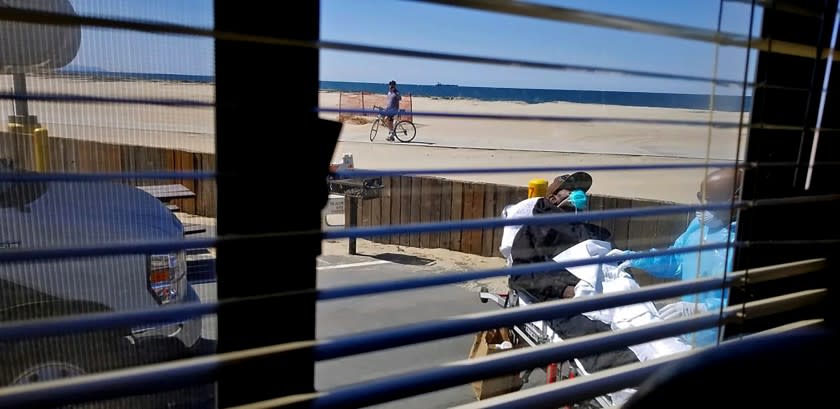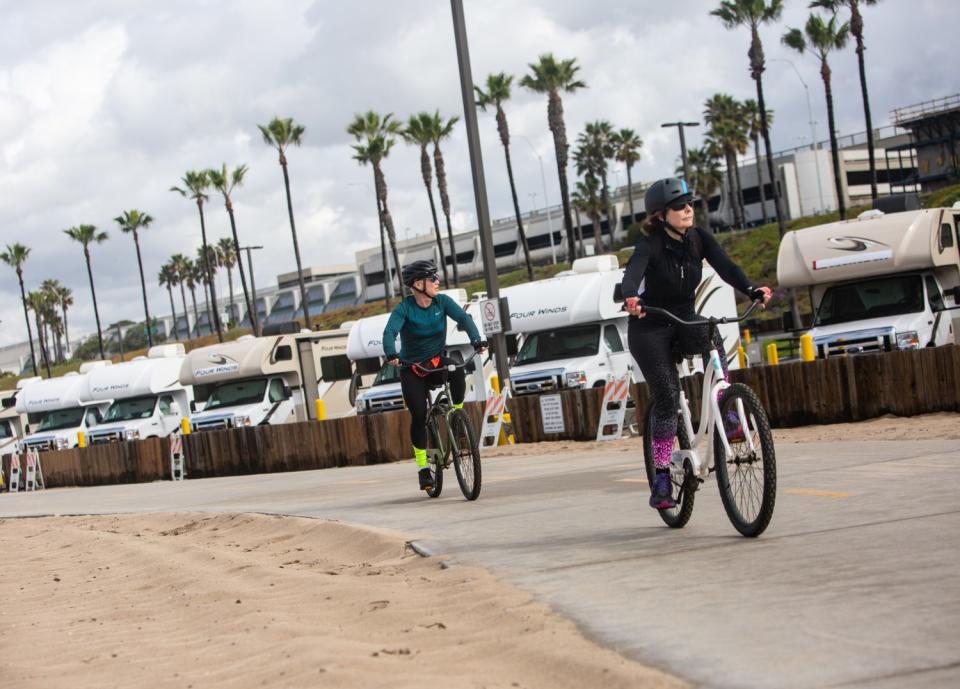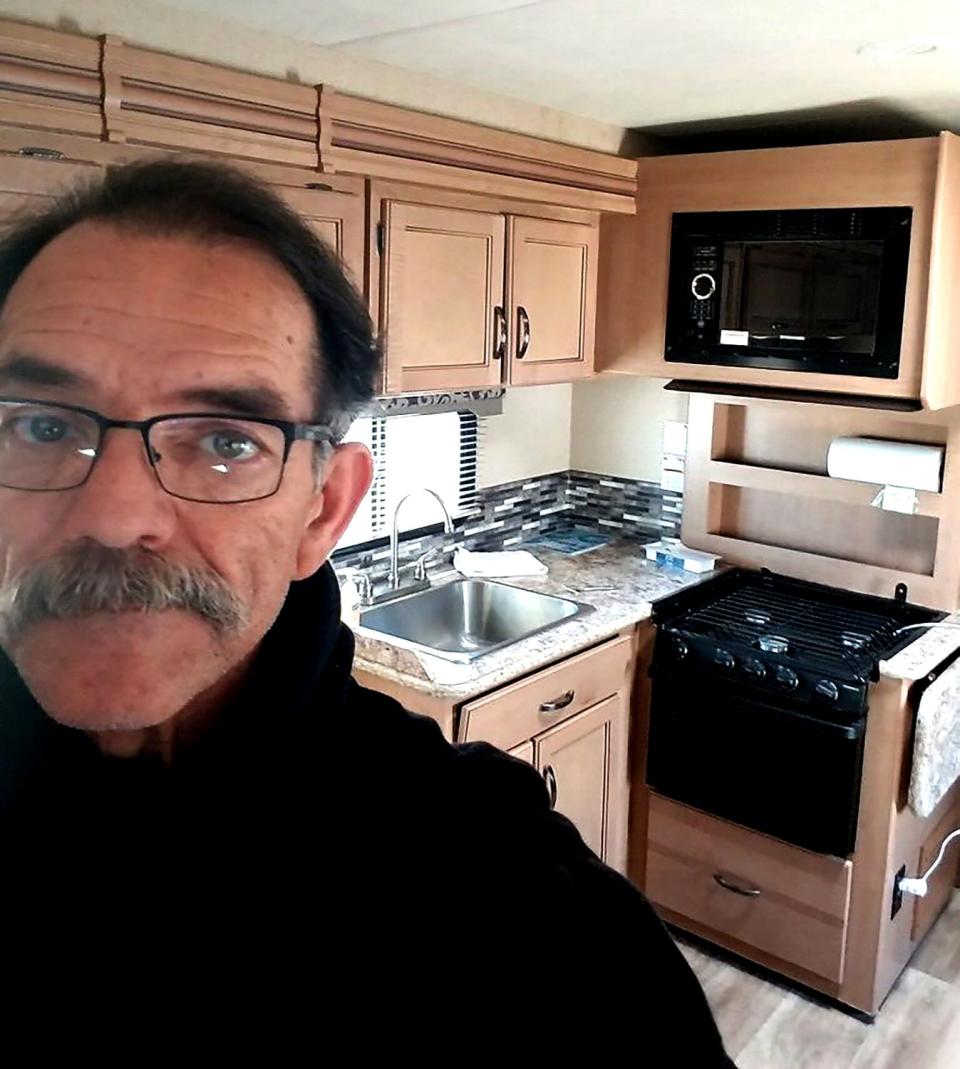He thought he had coronavirus and had nowhere to go. He spent five days alone in his car

Reggie Dominguez sat in his car dazed, listening to the radio.
He had been in the parking lot of the Kaiser Permanente in Baldwin Park Medical Center for three days and alone in his car for two days before that, suffering through diarrhea, cold sweats and chills, interrupted by coughing fits that shook his entire body. A doctor and an emergency room had turned him away. Both told the 63-year-old that his symptoms weren't severe enough to merit a test for the novel coronavirus and to call 911 if things got worse.
Dominguez, a Los Angeles native whose high cheekbones, piercing eyes and thin mustache give him a striking resemblance to Clark Gable, had driven his 2009 Mercedes Benz SUV from his mother's home in El Paso to Southern California to visit his two sons. After arriving, he developed flu-like symptoms and, understanding the risk, refused one son's offer to stay at his house until he could get tested. So Dominguez was essentially homeless.
"I didn't want to propagate this thing," he told The Times.
Once in Los Angeles, his health continued to decline and the former Metropolitan Transportation Authority employee was down to his last $40. It was Tuesday, and he'd been sick for five days.
On the radio, KPCC-FM (89.3) was playing Larry Mantle's public affairs show. The guests included an official from the Los Angeles Homeless Services Authority and two homeless providers, including Rev. Andy Bales of Union Rescue Mission. Mantle asked for Angelenos living in their cars or on the street to call in. They heard from one man who lived in his van in Orange and had no place to take a shower or find food to eat.
Then, "Reggie in Baldwin Park" came on, his words punctuated by a brief coughing fit.
"I don’t want to expose anyone to the virus, so I have been isolating myself in the car," Dominguez told KPCC.
One of Mantle's guests told him about some online resources. But after the show, Bales got Dominguez's phone number from the switchboard, called and told him to come to the Union Rescue Mission as soon as possible. Dominguez barely had enough gas to get there.
"Things were looking pretty grim with my symptoms and financially," he said.
Somehow, Dominguez managed to get to skid row, where Bales and a nurse on staff donned masks and gloves, and helped him into the mission's gym, which has been serving as a quarantine room. Bales worried that Dominguez wouldn't make it through Tuesday night and so made sure Dominguez's phone was charged just in case he had to call 911.
"When he stood up, he was out of breath," Bales said. "The clinic said he was sicker than anyone who had complained of the common flu or other viruses that are going around."
Bales has had several other homeless clients in quarantine, too. He thinks most have the flu, but he can't be sure. Their tests are still out. On Friday, he brought yet another man who was listening to KPCC to the gym.
Throughout all of this, he has been waiting with a sense of foreboding, knowing what will eventually come — a test result showing that a homeless person is positive for the coronavirus.

If that happens, public health officials say the virus and the COVID-19 disease it causes will rip through the already high-risk population with a devastating and likely deadly speed, putting even more pressure on overwhelmed hospitals.
Nurses and shelter providers describe how the close knit community on skid row — the largest concentration of homeless people in the United States — has few tests, medical supplies or clinics. And because skid row is crowded with street encampments and packed shelters, there's also the issue of people not having enough room to socially distance themselves from others to slow the spread of the virus.
Dominguez was able to get tested and was sent to Dockweiler Beach, where he's staying in one of the 112 trailers that are being used to quarantine people who test positive or have symptoms of COVID-19. As of Friday morning, there were 21 patients living in the trailers, according to county officials, though the number fluctuates as new cases arrive.
Many of the patients are homeless, said Shannon Fernando, a nurse there and chief innovations officer at the Los Angeles Christian Health Center.
Steven Frasher, a spokesman for the L.A. County Emergency Operations Center, said officials weren't tracking patients' housing status, but added that the trailers at Dockweiler were "open to anyone in the county who doesn’t have the ability or resources to shelter and isolate where thy are, and that would include persons experiencing homelessness."
Dominguez said he is weak but feeling better after each nap and each meal. Still Fernando, who has helped with his treatment, said he won't know if he actually has the virus until at least early next week. A backlog at the testing lab has made it challenging to get answers for people who suspect they have the coronavirus, she said.

So far, Fernando's skid row clinic, Joshua House, has sent four people to trailers at Dockweiler Beach and is testing other people outside their clinic on the street. Anyone can walk up. But Joshua House only has 250 tests to give and so Fernando is hoping that more are on the way. Through Friday, the clinic had tested 28 people, she said.
As more symptomatic homeless people emerge, though, Fernando said she is worried whether there will be enough trailers and other spaces to isolate patients.
"The issue is, that we are so far behind in L.A. County in our testing capacity and capabilities," she said. "I think, for us, our biggest concerns as a clinic, and even for our partners on the ground, is, what do we do with these most vulnerable people when they start having symptoms and we need to isolate them? Like what are the viable options for us?"
Bales concurred, saying that, in addition to the lack of resources, one of the biggest challenges is the long wait for test results.
Jaime Alvarez, who is homeless, just lived through it and lives at the Los Angeles Mission. For the past several months, he has been there as part of a rehabilitation program.
Alvarez didn’t imagine he’d find himself homeless after moving to the United States from Mexico in 2000. For a while, the 42-year-old did well, working as a carpenter and sharing an apartment in East Los Angeles with strangers. But soon, the depression set in. He missed his family. He started using drugs. He stopped going to work, lost his apartment and his car.
Earlier this month, he began to feel ill with flu-like symptoms. He asked if he could visit the mission's clinic.
“My throat hurt. It hurt to swallow. I spent several days feeling like that,” Alvarez said. “They told me that probably I had the coronavirus.”
Despite not having some of the telltale symptoms, such as shortness of breath, and not having any underlying health conditions, such as asthma, he was tested by Fernando's colleagues for the coronavirus. That was March 17, according to Herb Smith, the mission's president and chief executive.
Doctors told Alvarez to stay in isolation for 14 days, and he was placed in the mission's Spanish Chapel — a large multi-purpose room that has a TV and a bathroom. Three other sick people have been living there too, and nurses and case managers speak to them all by phone.
One person they put into quarantine refused to stay. That worried Smith. His staff tried to find everyone whom that person had contacted, in hopes of warning them about their potential exposure to the coronavirus.
Smith said his staff are adjusting to the new reality. They continue to help people off the street, knowing that the close proximity inside the shelter could allow the virus to quickly spread.
"With everyone coming through the door," Smith said, "it's difficult to get the hand washing and temperature taking consistent."
Alvarez spent days in the Spanish Chapel and Smith became frustrated that he hadn't heard back about his test results. But finally, after more than a week, they learned that the results were negative.
Alvarez says he feels fine, though out of quarantine, remains enrolled in the mission's rehabilitation program. As for the others still in the Spanish Chapel, Alvarez says he doesn’t know whether they have the coronavirus.
“There are a lot of people that are like this, coughing and coughing,” he said.

